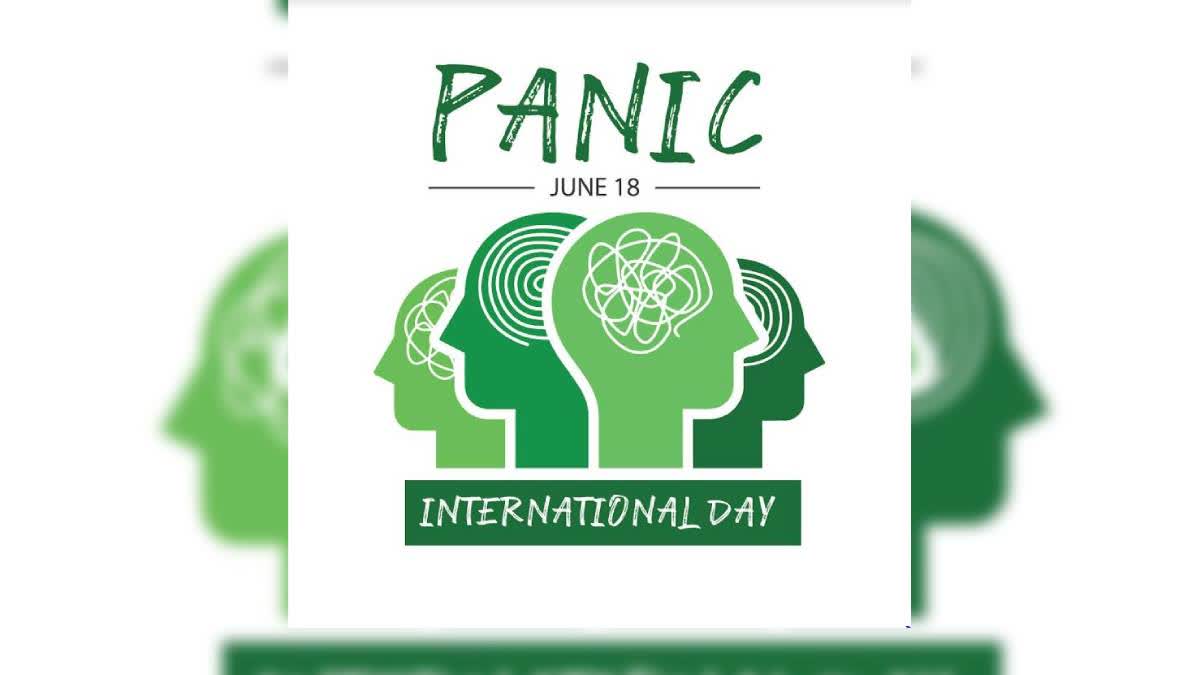Hyderabad:The International Panic Day is celebrated on June 18 to generate awareness about unexpected panic situations, help people get rid of anxiety and to understand the benefits of remaining calm.
Modern medicine and the rising standards of living have helped us achieve a safer and more healthy environment. But it has also brought with it new struggles that we have to deal on daily basis. We experience various factors like depression, anxiety, panic attacks, peer pressure, and many others that are causing a decline in mental health and wellbeing.
Aim of International Panic Day
The International Panic Day is aimed at helping people suffering from panic disorders. We should encourage people who are battling in their minds to take it easy, ease their troubled thoughts and make them comfortable. It is a day to reflect on our conditions and to help ourselves evaluate a better course of action. There will always be reasons to make us feel inferior, but on this day, we should promise ourselves that we will not purposefully make anyone or ourselves feel low.
Panic is beyond physical harm. As the overall intelligence of the population increases, so does the risk of mental conditions that can be painful or difficult to handle. Our social system rewards skilled, hard-working, and lucky people. But there will always be some unsuccessful people, those who are dissatisfied, heartbroken, panicked, under pressure, depressed or mentally ill. As long as the social norms exist, there will always be individuals that are affected by these pre-set social norms.
Causes of panic disorder
As with many mental health conditions, the exact cause of panic disorder is not fully understood. But it's considered to be linked to a combination of things such as
- A traumatic or very stressful life experience, such as bereavement
- Having a close family member with panic disorder
- An imbalance of neurotransmitters (chemical messengers) in the brain
Panic disorder symptoms
- Racing heartbeat
- Feeling faint
- Sweating
- Nausea
- Chest pain
- Shortness of breath
- Trembling
- Hot flushes
- Chills
- Shaky limbs
- Choking sensation
- Dizziness
- Numbness or pins and needles
- Dry mouth
- Feeling of dread or a fear of dying
- Churning stomach
- Tingling in your fingers
- Feeling disconnected to your body
Ways to manage panic and anxiety
- Remember this will pass:During a panic attack, it helps if we remind ourselves that these feelings will pass and will cause no physical harm.
- Take deep breaths:Deep breathing can benefit people with anxiety disorders and panic attacks. Panic attacks can cause rapid breathing and chest tightness, making the breaths shallow. Shallow breathing can worsen feelings of anxiety and tension.
- Smell some lavender:A 2019 study found that inhaling lavender oil reduces blood pressure levels in people with preoperative dental anxiety.
- Find a peaceful spot:Some people may find that certain sights and sounds intensify panic attacks. If possible, try to find a more peaceful spot. This could mean leaving a busy room or leaning against a nearby wall.
- Focus on an object:When distressing thoughts, feelings, or memories overwhelm someone, concentrating on something physical in their environment can help ground them.
- The 5-4-3-2-1 method:The 5-4-3-2-1 method is a grounding technique and a type of mindfulness. It helps to direct the person’s focus away from sources of stress.
- Repeat a mantra:A mantra is a word, phrase, or sound that may help with focus and provide strength. Internally repeating a mantra can help to reduce feelings of anxiety, stress, and panic. The mantra can take the form of reassurance and may be as simple as, “This too shall pass.” For some, it may have a more spiritual meaning.
- Walk or do some light exercise:Walking can remove a person from a stressful environment, and the rhythm of walking may also help them regulate their breathing.
- Try muscle relaxation techniques:Another symptom of panic attacks is muscle tension. Practicing muscle relaxation techniques may help limit an attack. If the mind senses that the body is relaxing, other symptoms such as rapid breathing may also diminish.
- Picture a happy place:A person’s happy place should be somewhere they would feel relaxed, safe and calm. The specific place will be different for everybody.
Facts about panic attack
- There is not always a trigger
- A panic attack can feel like you’re dying
- Panic attacks can happen while you’re sleeping
- Panic attacks activate the ‘flight or fight’ response
- Avoidance is not the best policy
- Panic attacks can be treated
Panic disorder can lead to complications
Panic disorder is treatable so it's best to get medical help as soon as you can. If you do not get medical help, panic disorder can escalate and become very difficult to cope with. Following which, you're more at risk of developing other mental health conditions, such as agoraphobia or other phobias, or an alcohol or drug problem. Having panic disorder may affect your ability to drive. The law requires you to inform the Driver and Vehicle Licensing Agency (DVLA) about a medical condition that could impact your driving ability.
Panic disorder in children
If your child has the signs and symptoms of panic disorder, they should be taken to a doctor. After taking a detailed medical history the physician will carry out a thorough examination to rule out any physical causes for the symptoms. They may refer your child to a specialist for further assessment and treatment. The specialist may recommend a course of Cognitive Behavioural Therapy (CBT) for your child.
Read more
Lifestyle, not being 'morning' or 'evening' person, impacts longevity, research says
